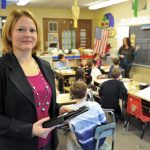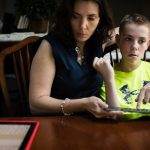A study co-authored by Neag School doctoral candidate, Robert Cotto, and former faculty member Sarah Woulfin, is featured. A survey of more than 150 parents whose children attend school in Hartford found that child care needs and concerns about the effectiveness of schools’ COVID-19 safety measures strongly impacted whether or not families sent their children back to school buildings for in-person learning in fall 2020.
Virtual classrooms may become a permanent fixture in the state of Connecticut. New legislation tasks the state’s Department of Education to develop plans for a K-12 statewide remote learning school that would use the same curriculum and have the same school year length as a traditional school, but would be under the jurisdiction of the State Board of Education.
“Teachers have new fluency and technology,” says Michael Young, who coordinated the educational technology program at UConn’s Neag School of Education. “Students have new fluency. Society and legislatures have a sense that this is doable now, because we did it for a year.”
With the pandemic projected to set women back a decade in the workplace, we take listener calls and talk with two working mothers about how their lives have been affected this past year. We’re joined by Quiana Agbai, a Boston parent, entrepreneur, and author of the blog and Instagram account “Harlem Love Birds,” and Jennie Weiner, a Somerville parent and associate professor of educational leadership at the University of Connecticut.
From a young age, Madison Corlett ’16 (ED), ’17 MA, was excited about helping others, raising money through lemonade stands and other fundraisers, then donating the money to local causes.
“I think it just revealed some of the deep inequities that have existed but didn’t really surface until it was forced to,” says Neag Professor of Educational Policy Casey Cobb. “So that was one of the main things that we’ve learned. I think a lot of schools adjusted very quickly and really made new efforts and creative efforts to keep contact with their families and their kids — with home visits in a safe manner and bringing food to families in need.”
Sandra Chafouleas, Board of Trustees Distinguished Professor and Neag Endowed Professor of educational psychology and founder of the Collaboratory on School and Child Health (CSCH), spoke with Julie Bartucca of the UConn 360 podcast about ways parents can support their children’s well-being during this time, as well as about how to talk to kids about the upheaval going on in the U.S.
Nearly a year since the nation went into lockdown due to the COVID-19 pandemic, just about everyone is struggling to maintain a semblance of normality. Parents of school-aged children have taken to social media and countless news stories have been written on the difficulties of balancing remote learning with remote working.
Children don’t come with how-to manuals. Even if they did, they would all require a manual of their own, tailored to their unique make and model. That’s why caregiving can be rewarding, as well as puzzling and demanding – particularly for family caregivers of children with disabilities. Although these caregivers often report that the role gives them a sense of purpose, it usually comes with physical, emotional and financial strains. COVID-19 has added major hurdles to accessing, delivering and evaluating special education services.
“We all know remote learning will never replace the classroom experience. We also know that the health and safety of our students, staff, and their families must be the primary consideration when making decisions about school operations. The two are not mutually exclusive. In an effort to promote the best continuity of education in Connecticut, whether in person or remotely, we must use the resources available, plan accordingly, and act responsibly,” writes Miguel Cardona.



